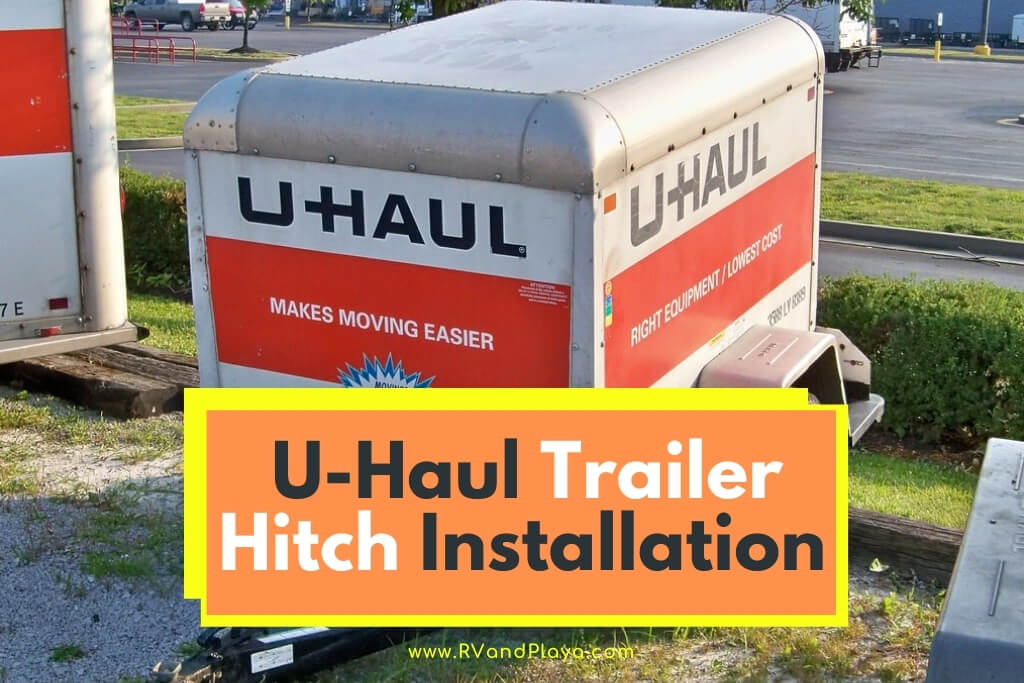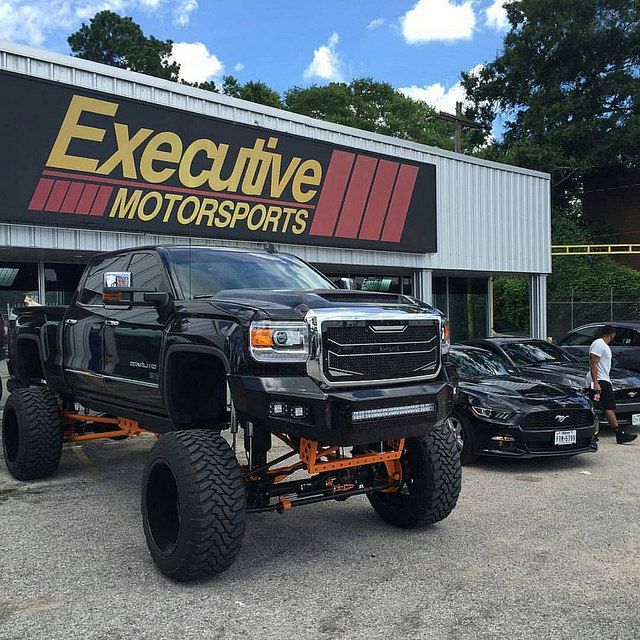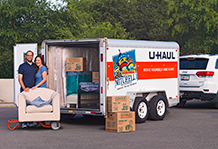U-Haul Tow Hitch: Your Comprehensive Guide to Towing with Confidence

U-Haul Tow Hitch: Your Comprehensive Guide to Towing with Confidence
For millions of DIY movers, adventurers, and those needing to haul equipment, the thought of towing often brings U-Haul to mind. While U-Haul is synonymous with rental trucks and trailers, it also plays a pivotal role in equipping vehicles with the necessary hardware: the tow hitch. A "U-Haul tow hitch" isn’t a hitch manufactured by U-Haul, but rather a high-quality tow hitch – from leading brands like CURT, Draw-Tite, or Reese – expertly sold and installed by U-Haul technicians. It’s the essential connection point that transforms your vehicle into a towing powerhouse, enabling you to confidently pull anything from a small utility trailer to a substantial travel trailer.
This comprehensive guide will demystify the U-Haul tow hitch, exploring its importance, the types available, the installation process, key considerations, and practical advice to ensure your towing experience is safe, efficient, and stress-free. Whether you’re planning a cross-country move, a weekend camping trip, or simply need to transport materials, understanding the ins and outs of a U-Haul tow hitch is your first step towards confident towing.
Understanding the U-Haul Tow Hitch Ecosystem
U-Haul’s expertise in towing extends far beyond just renting equipment. They are a major provider of tow hitches and related accessories, offering a full-service solution for vehicle owners. When you refer to a "U-Haul tow hitch," you’re typically talking about a receiver hitch system that U-Haul has recommended, sold, and professionally installed on your vehicle.
U-Haul’s Role in Towing:
- Expert Consultation: U-Haul specialists help you determine the correct hitch class and accessories based on your vehicle’s specifications and your towing needs.
- Quality Products: They stock and install hitches from reputable manufacturers, ensuring durability and reliability.
- Professional Installation: Their certified technicians possess the knowledge and tools to install hitches correctly, adhering to safety standards and manufacturer guidelines.
- Comprehensive Solutions: Beyond the hitch, U-Haul provides essential wiring harnesses, ball mounts, hitch balls, and other accessories, making it a one-stop shop for all your towing requirements.
Choosing U-Haul for your hitch installation provides peace of mind, knowing that your setup is designed for safety and backed by a nationwide lifetime warranty.
Types of Tow Hitches Available Through U-Haul
The world of tow hitches is diverse, categorized primarily by their towing capacity and design. U-Haul offers a range of options to suit various vehicles and towing demands. The most common type is the receiver hitch, which uses a square receiver tube to accept a removable ball mount.
Receiver Hitches
Receiver hitches are classified into different "classes" based on their Gross Trailer Weight (GTW) and Tongue Weight (TW) capacities.
- Class I (Light Duty):
- GTW: Up to 2,000 lbs
- TW: Up to 200 lbs
- Receiver Size: 1-1/4"
- Ideal For: Small cars, compact SUVs, bike racks, small utility trailers, very light loads.
- Class II (Medium Duty):
- GTW: Up to 3,500 lbs
- TW: Up to 350 lbs
- Receiver Size: 1-1/4"
- Ideal For: Sedans, smaller SUVs, small boats, ATV trailers, U-Haul 4×8 cargo trailers.
- Class III (Heavy Duty):
- GTW: Up to 8,000 lbs
- TW: Up to 800 lbs
- Receiver Size: 2"
- Ideal For: Larger SUVs, pickup trucks, minivans, medium-sized campers, U-Haul 5×8, 6×12, and Auto Transport trailers. This is the most common class.
- Class IV (Super Heavy Duty):
- GTW: Up to 10,000 lbs
- TW: Up to 1,000 lbs
- Receiver Size: 2"
- Ideal For: Full-size trucks, heavy-duty SUVs, larger travel trailers, car haulers.
- Class V (Extra Heavy Duty):
- GTW: Up to 17,000 lbs (often higher with weight distribution)
- TW: Up to 1,700 lbs
- Receiver Size: 2" or 2-1/2"
- Ideal For: Commercial trucks, large RVs, very heavy-duty towing applications.
U-Haul technicians are skilled at matching the appropriate hitch class to your vehicle’s towing capacity and your specific towing requirements, ensuring a safe and compliant setup.
Other Towing Components
- Weight Distribution Hitches: For heavier trailers (typically over 5,000 lbs GTW), a weight distribution hitch helps distribute tongue weight evenly across all axles of the tow vehicle and trailer, improving stability and control. U-Haul can install and set up these systems.
- Gooseneck & Fifth Wheel Hitches: While less common for typical U-Haul rental scenarios, these heavy-duty hitches are available for pickup trucks needing to tow large RVs, horse trailers, or commercial equipment, offering superior stability and capacity.
The U-Haul Hitch Installation Process
Getting a tow hitch installed at U-Haul is a streamlined process designed for efficiency and safety.
- Consultation & Vehicle Assessment: You provide information about your vehicle (make, model, year) and your intended towing needs. U-Haul’s system will then identify compatible hitch options and your vehicle’s maximum towing capacity.
- Hitch & Wiring Selection: Based on the assessment, U-Haul recommends the appropriate receiver hitch class and the necessary wiring harness (e.g., 4-flat for basic lights, or 7-way for additional functions like electric brakes and battery charging).
- Professional Installation:
- Hitch Mounting: Trained technicians securely bolt the hitch receiver to your vehicle’s frame. This may involve drilling, minor trimming, or temporarily lowering the exhaust, depending on the vehicle.
- Wiring Harness Installation: The electrical wiring harness is carefully integrated into your vehicle’s existing electrical system to power the trailer’s lights (tail, brake, turn signals). For 7-way connectors, additional connections for electric brakes, reverse lights, and auxiliary power are made.
- Quality Check: After installation, all connections are tested to ensure proper function.
- Customer Hand-Off: The technician will explain how to use your new hitch, including proper ball mount selection, hitch ball attachment, and basic towing safety tips.
- Nationwide Lifetime Warranty: U-Haul stands behind its hitch installations with a nationwide lifetime warranty, covering both parts and labor for as long as you own the vehicle.
The entire process typically takes 1 to 3 hours, depending on the vehicle and the complexity of the installation.
Benefits of Getting Your Tow Hitch from U-Haul
Choosing U-Haul for your tow hitch installation offers several distinct advantages:
- Unparalleled Expertise: U-Haul technicians are trained specifically in hitch installation and towing dynamics, ensuring your setup is safe and compliant.
- Safety First: They prioritize safety, correctly matching the hitch to your vehicle’s specifications and ensuring all components meet industry standards.
- Convenience & Accessibility: With thousands of locations across North America, finding a U-Haul for hitch installation is easy. It’s a one-stop shop for hitches, wiring, ball mounts, and even rental equipment.
- Wide Selection of Top Brands: U-Haul offers hitches from leading manufacturers, providing a range of options for different budgets and needs.
- Nationwide Lifetime Warranty: This significant benefit provides peace of mind, knowing your investment is protected against defects in parts or workmanship for the life of your vehicle.
- Compatibility Assurance: If you plan to rent U-Haul trailers, getting your hitch from them ensures your vehicle is properly equipped and compatible with their rental fleet.
Important Considerations Before Installation
Before you commit to a U-Haul tow hitch installation, keep these critical factors in mind:
- Vehicle Towing Capacity: This is paramount. Never exceed your vehicle’s manufacturer-specified towing capacity, which includes the GTW of the trailer and its contents, plus the TW. This information is typically found in your owner’s manual.
- Gross Trailer Weight (GTW) & Tongue Weight (TW): Understand the weight of what you plan to tow. GTW is the total weight of the loaded trailer. TW is the downward force exerted by the trailer coupler onto the hitch ball, typically 10-15% of the GTW.
- Trailer Type & Requirements: Different trailers have different needs. A utility trailer might only need a Class I or II hitch with 4-flat wiring, while a travel trailer could require a Class III or IV hitch with 7-way wiring for electric brakes.
- Electrical Needs: Determine if you need basic lighting (4-flat connector) or additional functions like electric trailer brakes, reverse lights, and auxiliary power (7-way connector).
- State and Local Regulations: Be aware of any specific towing laws in your region, especially regarding trailer brakes, safety chains, and lighting.
- Budget: Factor in the cost of the hitch, installation, wiring, and necessary accessories like a ball mount, hitch ball, and pin.
Tips for Safe Towing with Your U-Haul Hitch
Once your U-Haul tow hitch is installed, safe towing practices are essential.
- Perform Pre-Trip Inspections: Before every trip, check tire pressure on both your vehicle and trailer, ensure all lights are working (brake, turn, tail), confirm the hitch connection is secure, and safety chains are properly crossed.
- Load Your Trailer Correctly: Distribute weight evenly, with approximately 60% of the cargo weight in the front half of the trailer. This helps maintain proper tongue weight and prevents sway.
- Adjust Driving Habits:
- Slow Down: Reduce your speed, especially on turns and descents.
- Increase Following Distance: You’ll need more time and distance to stop with a trailer.
- Wider Turns: Account for the trailer’s path, taking wider turns to avoid hitting curbs or other obstacles.
- Avoid Sudden Movements: Gradual acceleration, braking, and steering inputs are key to maintaining control.
- Practice Backing Up: Find an empty parking lot to practice backing up with your trailer. It takes practice to master the counter-intuitive steering.
- Regular Maintenance: Keep your hitch components clean and lubricated. Check bolts for tightness periodically.
- Understand Your Vehicle’s Limits: Always stay within your vehicle’s and hitch’s rated capacities.
Potential Challenges and Solutions
While U-Haul aims for a seamless experience, a few challenges can arise:
- Vehicle Incompatibility: Some vehicles, particularly unibody cars not designed for heavy towing, may not be able to accommodate a hitch for significant loads.
- Solution: U-Haul will advise on your vehicle’s limitations during the consultation. Consider a U-Haul rental truck if your vehicle isn’t suitable for your towing needs.
- Overloading: Exceeding your vehicle or hitch’s capacity is dangerous and can lead to mechanical failure or accidents.
- Solution: Always weigh your loaded trailer and know your capacities. U-Haul can help you understand these limits.
- Electrical Issues: Trailer lights not working, or intermittent power, can be frustrating.
- Solution: U-Haul technicians are experts at diagnosing and fixing electrical issues related to hitch wiring. Their warranty covers this.
- Hitch Corrosion: Exposure to elements can lead to rust on the hitch receiver.
- Solution: Regular cleaning, applying a protective lubricant or paint, and using a receiver hitch cover when not in use can extend the life of your hitch.
U-Haul Tow Hitch Estimated Price Table
Please note that these are estimated price ranges and can vary significantly based on your specific vehicle make and model, the complexity of the installation, regional labor rates, and current promotions. It is always best to get a personalized quote directly from U-Haul.
| Component/Service | Estimated Price Range (USD) | Notes |
|---|---|---|
| Hitch Receiver (Part) | Varies significantly by vehicle make/model and hitch class. | |
| Class 1 (Light Duty) | $150 – $250 | For smaller cars, light loads (bike racks, small utility trailers). |
| Class 2 (Medium Duty) | $200 – $350 | Sedans, smaller SUVs; light to medium trailers. |
| Class 3 (Heavy Duty) | $250 – $450+ | Most common for SUVs, trucks; medium to large trailers. |
| Class 4 (Super Duty) | $350 – $600+ | Heavy-duty trucks, larger trailers. |
| Class 5 (Extra Duty) | $450 – $800+ | Commercial applications, extremely heavy trailers. |
| Installation Labor | $100 – $250 | Typically a flat rate, depends on the complexity of the specific vehicle’s installation (e.g., bumper removal, drilling). |
| Wiring Harness (Part) | Essential for trailer lights. | |
| 4-Flat Connector | $75 – $150 | Basic lights (tail, brake, turn). |
| 7-Way Connector | $150 – $300 | Includes 4-flat functions plus reverse lights, electric brakes, 12V auxiliary power. |
| Hitch Accessories (Typical) | Often purchased separately or as a package. | |
| Ball Mount | $20 – $60 | Drop/rise depends on vehicle height and trailer coupling height for level towing. |
| Hitch Ball | $10 – $30 | Size (1-7/8", 2", 2-5/16") must match trailer coupler. |
| Pin & Clip | $5 – $15 | Secures the ball mount in the receiver. |
| Total Estimated Cost | $300 – $1200+ | For a complete setup (hitch, wiring, installation, basic accessories). |
Frequently Asked Questions (FAQ)
Q: Do I need a U-Haul-installed hitch to tow a U-Haul trailer?
A: No, you don’t have to get your hitch installed by U-Haul. However, your vehicle’s hitch must meet U-Haul’s safety and capacity requirements for the specific trailer you wish to rent. Getting it installed by U-Haul ensures full compatibility and peace of mind.
Q: How long does U-Haul hitch installation usually take?
A: Most standard hitch installations take between 1 to 3 hours, depending on the vehicle and the complexity of the wiring. You can get an estimated time when you book your appointment.
Q: Can U-Haul install a hitch on any vehicle?
A: No. U-Haul will only install a hitch on vehicles that are designed by the manufacturer to safely tow. They will assess your vehicle’s frame and overall towing capacity to determine if it’s suitable.
Q: Does U-Haul offer a warranty on hitch installations?
A: Yes, U-Haul provides a nationwide lifetime warranty on all custom-installed hitches for as long as you own the vehicle. This covers both parts and labor for defects.
Q: What’s the difference between a 4-flat and a 7-way connector?
A: A 4-flat connector provides basic trailer lighting (tail lights, brake lights, turn signals). A 7-way connector adds functionality for electric trailer brakes, reverse lights, and often a 12V auxiliary power source for charging a trailer battery.
Q: Can I install the hitch myself and just have U-Haul do the wiring?
A: Yes, U-Haul offers standalone wiring services. However, if they didn’t install the hitch, their lifetime warranty might not cover the hitch itself, only the wiring they installed.
Q: How do I know what class hitch I need?
A: The hitch class you need depends on your vehicle’s towing capacity and the Gross Trailer Weight (GTW) of what you plan to tow. U-Haul’s experts can help you determine the correct class based on your specific situation.
Conclusion
The U-Haul tow hitch, more accurately described as a high-quality tow hitch expertly installed by U-Haul, is an indispensable component for anyone looking to unlock their vehicle’s towing potential. From the initial consultation and selection of the appropriate hitch class to professional installation and a nationwide lifetime warranty, U-Haul provides a comprehensive and reliable solution.
By understanding the types of hitches available, the installation process, key considerations, and adhering to safe towing practices, you can confidently embark on your next moving project, outdoor adventure, or hauling task. Investing in a U-Haul-installed tow hitch means investing in peace of mind, knowing that your setup is safe, reliable, and ready to tackle the road ahead. Empower yourself to tow with confidence – your journey starts with a properly equipped vehicle.



